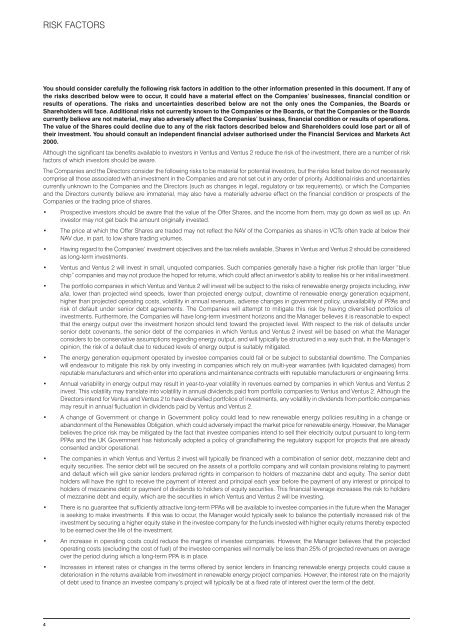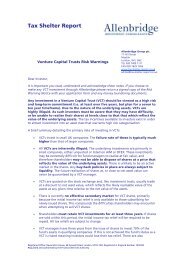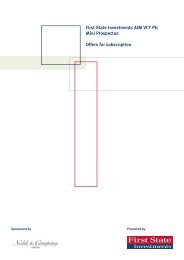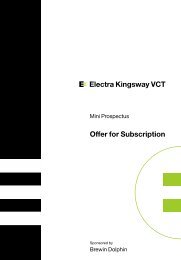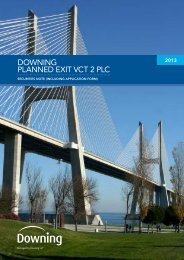Ventus VCT plc and Ventus 2 VCT plc - The Tax Shelter Report
Ventus VCT plc and Ventus 2 VCT plc - The Tax Shelter Report
Ventus VCT plc and Ventus 2 VCT plc - The Tax Shelter Report
Create successful ePaper yourself
Turn your PDF publications into a flip-book with our unique Google optimized e-Paper software.
RISK FACTORS<br />
You should consider carefully the following risk factors in addition to the other information presented in this document. If any of<br />
the risks described below were to occur, it could have a material effect on the Companies’ businesses, financial condition or<br />
results of operations. <strong>The</strong> risks <strong>and</strong> uncertainties described below are not the only ones the Companies, the Boards or<br />
Shareholders will face. Additional risks not currently known to the Companies or the Boards, or that the Companies or the Boards<br />
currently believe are not material, may also adversely affect the Companies’ business, financial condition or results of operations.<br />
<strong>The</strong> value of the Shares could decline due to any of the risk factors described below <strong>and</strong> Shareholders could lose part or all of<br />
their investment. You should consult an independent financial adviser authorised under the Financial Services <strong>and</strong> Markets Act<br />
2000.<br />
Although the significant tax benefits available to investors in <strong>Ventus</strong> <strong>and</strong> <strong>Ventus</strong> 2 reduce the risk of the investment, there are a number of risk<br />
factors of which investors should be aware.<br />
<strong>The</strong> Companies <strong>and</strong> the Directors consider the following risks to be material for potential investors, but the risks listed below do not necessarily<br />
comprise all those associated with an investment in the Companies <strong>and</strong> are not set out in any order of priority. Additional risks <strong>and</strong> uncertainties<br />
currently unknown to the Companies <strong>and</strong> the Directors (such as changes in legal, regulatory or tax requirements), or which the Companies<br />
<strong>and</strong> the Directors currently believe are immaterial, may also have a materially adverse effect on the financial condition or prospects of the<br />
Companies or the trading price of shares.<br />
• Prospective investors should be aware that the value of the Offer Shares, <strong>and</strong> the income from them, may go down as well as up. An<br />
investor may not get back the amount originally invested.<br />
• <strong>The</strong> price at which the Offer Shares are traded may not reflect the NAV of the Companies as shares in <strong>VCT</strong>s often trade at below their<br />
NAV due, in part, to low share trading volumes.<br />
• Having regard to the Companies’ investment objectives <strong>and</strong> the tax reliefs available, Shares in <strong>Ventus</strong> <strong>and</strong> <strong>Ventus</strong> 2 should be considered<br />
as long-term investments.<br />
• <strong>Ventus</strong> <strong>and</strong> <strong>Ventus</strong> 2 will invest in small, unquoted companies. Such companies generally have a higher risk profile than larger “blue<br />
chip” companies <strong>and</strong> may not produce the hoped for returns, which could affect an investor’s ability to realise his or her initial investment.<br />
• <strong>The</strong> portfolio companies in which <strong>Ventus</strong> <strong>and</strong> <strong>Ventus</strong> 2 will invest will be subject to the risks of renewable energy projects including, inter<br />
alia, lower than projected wind speeds, lower than projected energy output, downtime of renewable energy generation equipment,<br />
higher than projected operating costs, volatility in annual revenues, adverse changes in government policy, unavailability of PPAs <strong>and</strong><br />
risk of default under senior debt agreements. <strong>The</strong> Companies will attempt to mitigate this risk by having diversified portfolios of<br />
investments. Furthermore, the Companies will have long-term investment horizons <strong>and</strong> the Manager believes it is reasonable to expect<br />
that the energy output over the investment horizon should tend toward the projected level. With respect to the risk of defaults under<br />
senior debt covenants, the senior debt of the companies in which <strong>Ventus</strong> <strong>and</strong> <strong>Ventus</strong> 2 invest will be based on what the Manager<br />
considers to be conservative assumptions regarding energy output, <strong>and</strong> will typically be structured in a way such that, in the Manager’s<br />
opinion, the risk of a default due to reduced levels of energy output is suitably mitigated.<br />
• <strong>The</strong> energy generation equipment operated by investee companies could fail or be subject to substantial downtime. <strong>The</strong> Companies<br />
will endeavour to mitigate this risk by only investing in companies which rely on multi-year warranties (with liquidated damages) from<br />
reputable manufacturers <strong>and</strong> which enter into operations <strong>and</strong> maintenance contracts with reputable manufacturers or engineering firms.<br />
• Annual variability in energy output may result in year-to-year volatility in revenues earned by companies in which <strong>Ventus</strong> <strong>and</strong> <strong>Ventus</strong> 2<br />
invest. This volatility may translate into volatility in annual dividends paid from portfolio companies to <strong>Ventus</strong> <strong>and</strong> <strong>Ventus</strong> 2. Although the<br />
Directors intend for <strong>Ventus</strong> <strong>and</strong> <strong>Ventus</strong> 2 to have diversified portfolios of investments, any volatility in dividends from portfolio companies<br />
may result in annual fluctuation in dividends paid by <strong>Ventus</strong> <strong>and</strong> <strong>Ventus</strong> 2.<br />
• A change of Government or change in Government policy could lead to new renewable energy policies resulting in a change or<br />
ab<strong>and</strong>onment of the Renewables Obligation, which could adversely impact the market price for renewable energy. However, the Manager<br />
believes the price risk may be mitigated by the fact that investee companies intend to sell their electricity output pursuant to long-term<br />
PPAs <strong>and</strong> the UK Government has historically adopted a policy of gr<strong>and</strong>fathering the regulatory support for projects that are already<br />
consented <strong>and</strong>/or operational.<br />
• <strong>The</strong> companies in which <strong>Ventus</strong> <strong>and</strong> <strong>Ventus</strong> 2 invest will typically be financed with a combination of senior debt, mezzanine debt <strong>and</strong><br />
equity securities. <strong>The</strong> senior debt will be secured on the assets of a portfolio company <strong>and</strong> will contain provisions relating to payment<br />
<strong>and</strong> default which will give senior lenders preferred rights in comparison to holders of mezzanine debt <strong>and</strong> equity. <strong>The</strong> senior debt<br />
holders will have the right to receive the payment of interest <strong>and</strong> principal each year before the payment of any interest or principal to<br />
holders of mezzanine debt or payment of dividends to holders of equity securities. This financial leverage increases the risk to holders<br />
of mezzanine debt <strong>and</strong> equity, which are the securities in which <strong>Ventus</strong> <strong>and</strong> <strong>Ventus</strong> 2 will be investing.<br />
• <strong>The</strong>re is no guarantee that sufficiently attractive long-term PPAs will be available to investee companies in the future when the Manager<br />
is seeking to make investments. If this was to occur, the Manager would typically seek to balance the potentially increased risk of the<br />
investment by securing a higher equity stake in the investee company for the funds invested with higher equity returns thereby expected<br />
to be earned over the life of the investment.<br />
• An increase in operating costs could reduce the margins of investee companies. However, the Manager believes that the projected<br />
operating costs (excluding the cost of fuel) of the investee companies will normally be less than 25% of projected revenues on average<br />
over the period during which a long-term PPA is in place.<br />
• Increases in interest rates or changes in the terms offered by senior lenders in financing renewable energy projects could cause a<br />
deterioration in the returns available from investment in renewable energy project companies. However, the interest rate on the majority<br />
of debt used to finance an investee company’s project will typically be at a fixed rate of interest over the term of the debt.<br />
4


